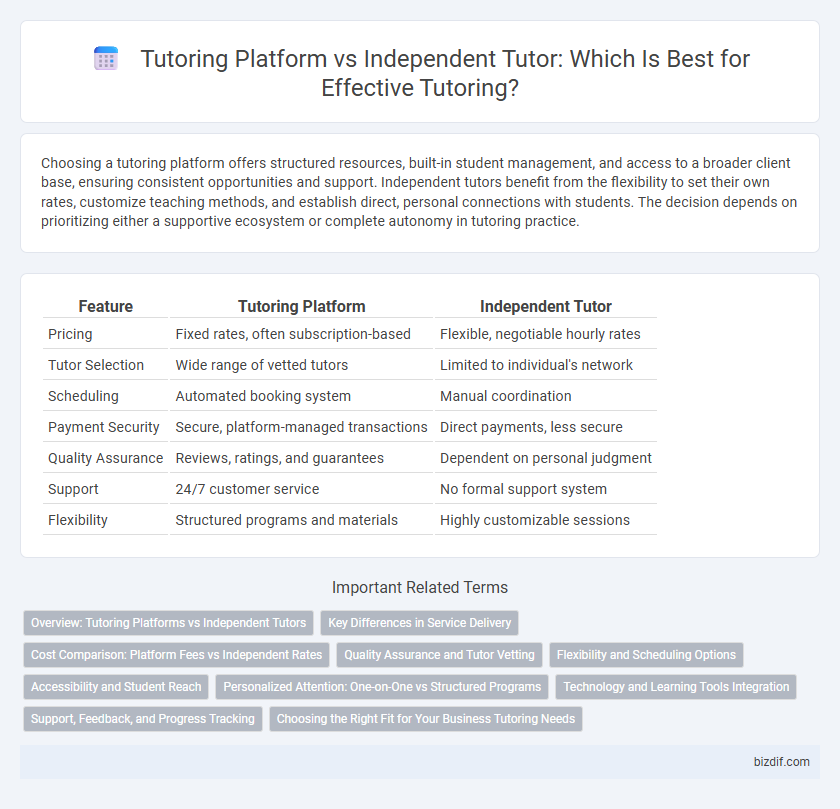Choosing a tutoring platform offers structured resources, built-in student management, and access to a broader client base, ensuring consistent opportunities and support. Independent tutors benefit from the flexibility to set their own rates, customize teaching methods, and establish direct, personal connections with students. The decision depends on prioritizing either a supportive ecosystem or complete autonomy in tutoring practice.
Table of Comparison
| Feature | Tutoring Platform | Independent Tutor |
|---|---|---|
| Pricing | Fixed rates, often subscription-based | Flexible, negotiable hourly rates |
| Tutor Selection | Wide range of vetted tutors | Limited to individual's network |
| Scheduling | Automated booking system | Manual coordination |
| Payment Security | Secure, platform-managed transactions | Direct payments, less secure |
| Quality Assurance | Reviews, ratings, and guarantees | Dependent on personal judgment |
| Support | 24/7 customer service | No formal support system |
| Flexibility | Structured programs and materials | Highly customizable sessions |
Overview: Tutoring Platforms vs Independent Tutors
Tutoring platforms offer structured access to a wide range of qualified tutors, comprehensive scheduling tools, and secure payment systems, enhancing convenience for students and parents. Independent tutors provide personalized attention, flexible scheduling, and often lower fees but may lack the extensive resources and guarantees found on established platforms. Choosing between platforms and independent tutors depends on priorities such as cost, customization, and trust in verified credentials.
Key Differences in Service Delivery
Tutoring platforms offer structured service delivery with standardized lesson plans, progress tracking, and centralized scheduling, ensuring consistency and accountability. Independent tutors provide personalized, flexible teaching methods tailored to individual student needs, often adapting sessions in real-time without standardized curriculum constraints. Platforms typically include administrative support and access to various tutors, while independent tutors emphasize direct communication and customized learning experiences.
Cost Comparison: Platform Fees vs Independent Rates
Tutoring platforms typically charge service or subscription fees ranging from 15% to 30% of the hourly rate, which can increase overall costs for students compared to hiring independent tutors. Independent tutors often set their own rates, usually ranging between $20 to $60 per hour, without additional platform fees, providing more cost-effective options. The choice between platform-based tutoring and independent tutors significantly impacts total tutoring expenses depending on fee structures and hourly rates.
Quality Assurance and Tutor Vetting
Tutoring platforms implement rigorous quality assurance protocols including standardized testing, continuous performance monitoring, and student feedback analysis to ensure consistent tutor excellence. Independent tutors lack formal vetting processes, making it challenging for students to verify qualifications and teaching effectiveness. Platforms provide secure, verified credentials and performance metrics, offering greater reliability and trust in tutoring quality.
Flexibility and Scheduling Options
Tutoring platforms offer extensive flexibility through diverse scheduling options, allowing students to book sessions anytime via user-friendly apps or websites. Independent tutors may provide more personalized scheduling but often have limited availability due to managing multiple commitments. Platforms typically support real-time adjustments and cancellations, ensuring seamless rescheduling compared to the fixed slots of individual tutors.
Accessibility and Student Reach
Tutoring platforms offer greater accessibility by connecting students with a wide range of tutors across different subjects and locations through user-friendly online interfaces. Independent tutors often have limited reach due to geographic constraints and less visibility without platform support. Platforms provide scalable student reach and streamlined scheduling, enhancing overall learning opportunities.
Personalized Attention: One-on-One vs Structured Programs
Tutoring platforms offer structured programs designed to follow standardized curricula and track student progress through systematic lessons. Independent tutors provide personalized one-on-one attention, tailoring their teaching methods and schedules to individual learning styles and specific needs. Personalized tutoring fosters deeper understanding and faster improvement, while platforms ensure consistency and comprehensive coverage of subjects.
Technology and Learning Tools Integration
Tutoring platforms leverage advanced technology and integrated learning tools such as AI-driven analytics, interactive whiteboards, and personalized learning modules to enhance student engagement and track progress effectively. Independent tutors may lack access to these scalable digital resources, limiting their ability to provide real-time feedback and adaptive learning experiences. Platforms also offer streamlined scheduling and resource sharing, optimizing the tutoring process through seamless technological integration.
Support, Feedback, and Progress Tracking
Tutoring platforms provide structured support with access to resources, one-on-one tutor communication, and reliable progress tracking systems, ensuring students receive consistent feedback. Independent tutors may offer personalized attention but often lack advanced tools to monitor progress or provide regular, systematic feedback. Platforms integrate data-driven analytics that help tailor learning paths, enhancing overall student development and accountability.
Choosing the Right Fit for Your Business Tutoring Needs
Choosing between a tutoring platform and an independent tutor depends on your business's specific needs, budget, and scheduling flexibility. Tutoring platforms offer a wide range of vetted professionals with varied specialties, providing scalability and consistent quality control through standardized processes. Independent tutors often deliver personalized attention and customized lesson plans, ideal for businesses requiring tailored support and direct communication with educators.
Tutoring platform vs independent tutor Infographic

 bizdif.com
bizdif.com